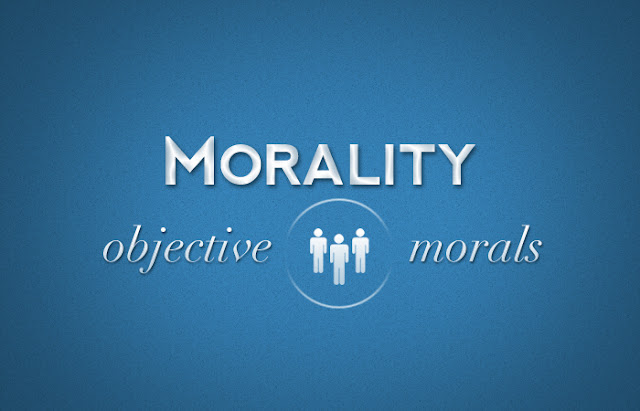Morals in the Light of Atheism...
By Anthony W Brooks
Some time ago an Atheist named Thomas Druschke wrote an article over Objective Morality. Found here:
http://atheistreformation.blogspot.com/2017/02/morality-as-secular-humanist.html?m=1
In our last article we responded to the definitions he used to define Objective Morality. Since the definitions were precise and we'll stated, they could stand alone and responding to them was easy. But Apparently we were intellectually dishonest because we didn't respond to the whole article. Even though the definitions were only dealt with briefly and I can honestly say, inconsistently, the response I recieved was rather surprising. So I'll now deal with the rest of the article.
1. "In perhaps one of the most clear and concise definitions of terms, it can be seen that these are not subjective or relativistic in any way, nor are they contingent upon the human brain to understand or implement them."
This is when I have to ask what the morals are contingent upon? He will then go into an explanation of an FMRI and EEG being used to measure them. Obviously the morals in question are processed in the brain, but where do they originate from? This is definitely something that we need given. These morals are not like the Laws of Logic, which the Atheist could pin as accidents of nature. These aren't like that, they are not reliant on nature in that manner. So we need to know what an Atheist would say to this...
2. "For instance, an individual could be put in an FMRI or attached to an EEG machine and exposed to a variety of stimuli. By looking at and paying attention to which regions of the individual's brain activate or light up, you can objectively determine what that does to that individual, and answer some important questions. Did that stimulus promote happiness, well-being, or health; or minimize unnecessary harm or suffering in that individual? Did it somehow do both? Or did that stimulus cause the opposite to happen? The experience for the individual and how they interpret how it made them feel throughout the test is subjective, that much is true. However, the results obtained by the test are objectively evident as to what they represent, regardless of how the individual judged their unique experience. No, not every single person will process those stimuli in the same way, however, the overwhelming majority would respond in a similar way, with the same regions of the brain activating similarly as well, thus providing an objective overall metric with which to judge or diagnose an action or choice to be moral or right."
Here's where there is an issue. This produces a rule by authority which is where the Atheist seems unfair to our modern world. A subjective test with objective results is taken. These objective results are then compiled and compared and the overwhelming majority gets to decide what is moral with the multiple minorities being left out.
Scenario: Let's say we were testing a specific amount of pain on two individuals. On one, the individual responds normally, "ouch!" And feels discomfort and it registers an immoral result. It is wrong to hurt that individual in that manner, to that individual. (Which is where the subjectivity comes in.) But the evidence obtained was objective because the results were clear.
The other person is given the same test but it registers as pleasure. They respond as emotionally heightened and aroused. It registers morally sound to that individual. So it is right to hurt that individual in that manner. (Subjective.) And the test results were objective in the same manner as the last.
All of the sudden, because one result was more popular, it is wrong for the other to exist or be practiced. It is obvious exclusion. But ultimately, how can this result be put to practice? Is it right for an Atheist who is the authority in themselves to say that one individual is more right than the other because one had the more popular result and understanding? Not really.
He then goes into an explanation of the Divine Command Theory. Which isn't a specific theory that I follow. So it really does me no good to respond to that end. But I believe that I covered the meat of his argument.
Consistently, an Atheist would say that morals are organized in the brain because they have no outside governance, but he has said they are not contingent in the brain, so I have to ask him where these morals come from? The majority of the population? If an act is carried out on a remote island with no populace, is it moral or immoral based solely upon the one person?
Also, is it fair to say that the minority of the population are left as immoral for any one strange belief they may have, can the Atheist (who consistently sees themselves as the final authority, and according to the animalistic side of things is the final authority in survival) exclude these beliefs as immoral based on a few brain scans? What is the authority that can interpret these scans?
These are all great questions.
Soli Deo Gloria!


Comments
Post a Comment